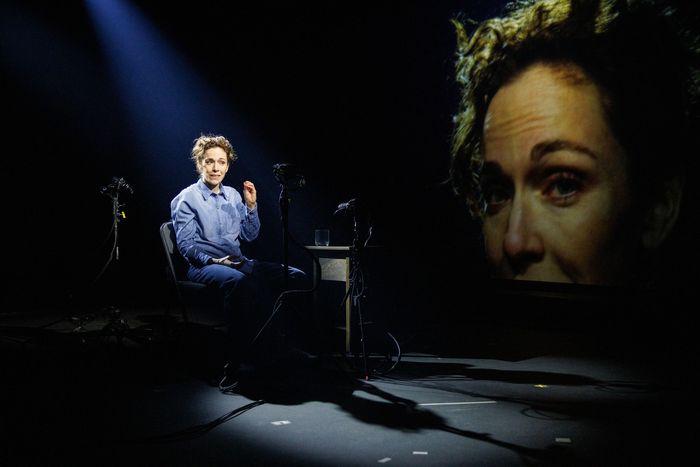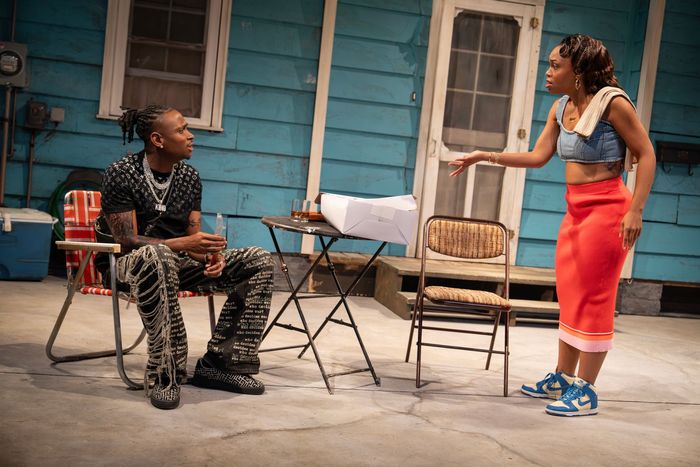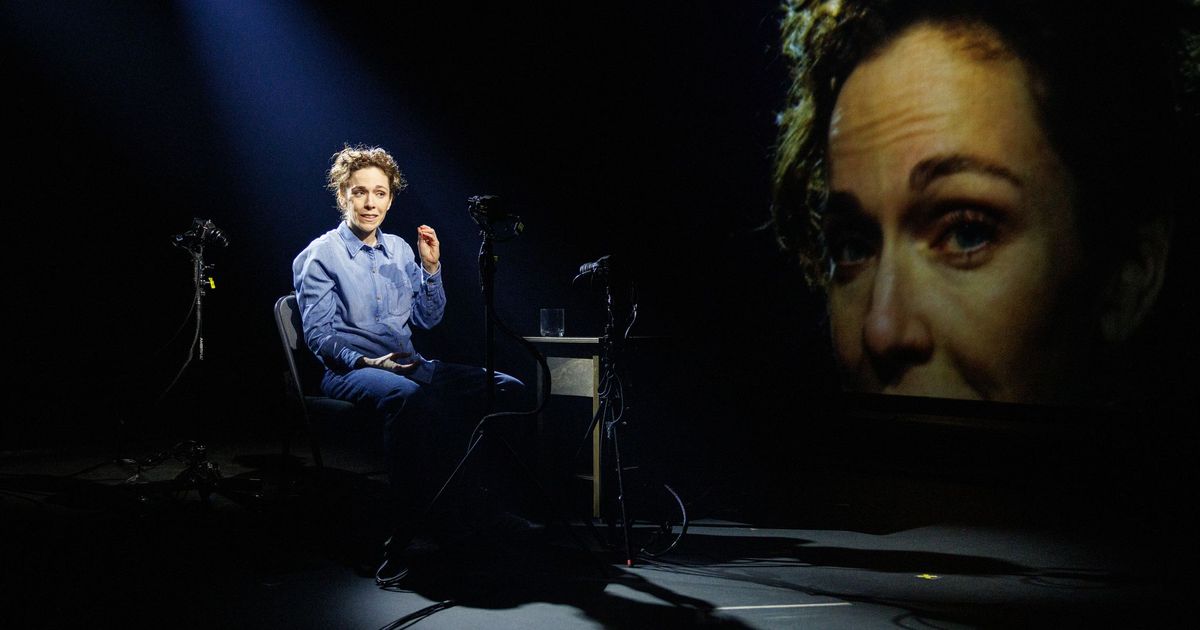


Jen Tullock in Nothing Can Take You From the Hand of God. Photo: Maria Baranova
How do you go home when “home” is an unstable place to be? The question haunts Frances, a neurotic ex-Evangelical queer woman who, as embodied onstage by the actress Jen Tullock, has built herself up with the armor of a coastal intellectual. Tullock, who wrote Nothing Can Take You From the Hand of God with Frank Winters, introduces Frances in her preferred environment, a cozy book talk with an easy interlocutor, where she can opine in a measured, NPR-ready alto about her memoir of the trauma she endured growing up in Kentucky. But soon, the action glitches. Frances’s literary agent is calling, and the church she discussed in her book is threatening to sue. Tullock plays every role in the play and soon zips into the agent’s persona, talking fast, chewing gum. She’s also, in director Jared Mezzocchi’s staging, recording herself live on video, her face projected onto the screens that surround her. They are glitchy, too. As the agent rambles, the cameras onstage freeze Tullock’s face at unflattering moments, and the screens behind her display a series of grotesques. That’s just the beginning of the feeling that you’re watching something unstable, distorted, and more than a little haunted.
Frances, for the sake of her book release, heads back home to Louisville to try to smooth things over, and Tullock, Winter, and Mezzocchi keep you on your toes about what she encounters there. Maybe there are monsters back home — although Frances, who has made a career condemning her past, seems to have been more than a little free with the truth. In any case, as the audience encounters figures who don’t quite conform to her earlier descriptions, the play gives Tullock a showcase of characters. The actress, who worked with the ever-inventive Mezzocchi on the expansive The Wind and the Rainhas a whole menagerie of persons at her disposal. She’s loose and wide-limbed as Frances’s brother, a bro gone slightly to seed who still runs a Bible study in his backyard but is also happy to light up a joint, and then pinched and nervous and overbearing as her mother, Raelynn, who offers platitudes and canned phrases in lieu of direct communication.
Tullock’s characterizations are sharp enough to distinguish everyone clearly — I had the unnerving sense that, after spending a few minutes with me, she’d be able to quote my most telling mannerisms back at me — even as Nothing Can Take You From the Hand of God destabilizes its narrative. The play moves in a way that matches the fevered anxiety of its main character. Often, after a glitch sound and a transition, it takes a few seconds before you know which new character Tullock is playing and what their relationship may be to Frances. The play’s specifics give it a tactile and bumpy weirdness that makes it feel like real life: One powerful figure in the church is an expat, rendered by Tullock with an amusing drawl that suddenly turns ominous when he feels a line has been crossed.
In your program, Tullock (whose upbringing was in the Evangelical church) and Winters write that they were interested in some skeptical picking at the idea of ”the Canonized Queer Heroine” with Frances and look instead for “fractured and un-hashtaggable truths.” Those truths come together in a series of ands and butts, which layer upon and contradict each other, like the afterimages of Tullock in Stefania Bulbarella’s video design. It’s clear that some of Frances’s past has indeed been painful for her, but it’s also evident that there was comfort in religious life and its rituals, and that those rituals are held close by her family members and loved ones, whose relationships to this community have their own complexities. The crux of her contention with the church comes down to her book’s description of a friendship — or was it a relationship? A love affair? — with a Polish member of the congregation, Agnieszka. When Tullock plays both sides of conversations between Frances and Agnieszka, the performances are lovely and naturalistic. Maybe these two women can come to some understanding. And then, when recorded on video, immediately, the distortion sets in.
Whereas Nothing Can Take You From the Hand of God revels in murky, glitchy ambiguity, you can head to the Public for another drama that’s swinging hard for a cleaner, if less satisfying, resolution. Jordan E. Cooper’s musical Oh Happy Day! follows almost the same plot structure: The queer child of a religious upbringing must come home to work things through. Here, the stakes are heightened far past the point of a lawsuit. Keyshawn, played by Cooper, has been dispatched by God himself to reconcile with his sister Niecy (Tamika Lawrence) and father Lewis (Brian D. Coats), because he needs to encourage them to get aboard a boat before their neighborhood is subsumed in a biblical flood. It’s a seemingly impossible task: Keyshawn’s family lives in a beat-up corner of Laurel, Mississippi; they don’t own a boat; and as soon as he first appears onstage, everyone is cussing each other out. Also, just before the events of the play, Keyshawn died. If he can’t get through this, he’s not getting into whatever in this story passes for Heaven.
Jordan E. Cooper and Tamika Lawrence in Oh Happy Day! Photo: Joan Marcus
The heightened premise may be par for the course for Cooper, who broke out with the series of fervent and hilarious sketches that made up Ain’t No Mo’a play loosely strung together around the concept of the US government’s offering Black people plane flights back to Africa. In Oh Happy Day! Cooper is back with the director Stevie Walker-Webb, who’s great at exuberant satire, but even though Cooper’s dialogue has just as much wit here — “I would tell you the exact time,” God says to Keyshawn about the flood, “but it’s not really my style” — he’s shakier at sustaining a single scenario over the course of a show. In an extended first act, Keyshawn gets into circular arguments with Niecy and Lewis, which is apt for a family stuck in toxic cycles but repetitive to watch. Cooper’s maximalism and his fondness for a good gag can also let him evade sitting in some harder moments between characters for too long. Keyshawn’s accompanied on his quest by the “Divines,” a trio of ancient spirits who accompany people after their deaths, described as “the Clark Sisters meet Glinda the Good.” The Divines provide ample comic relief, and the actresses playing them — Tiffany Mann, Sheléa Melody McDonald, and Latrice Pace — sound unearthly good singing the music Donald Lawrence has written for the show, although I couldn’t escape the thought that they and the music both weren’t necessary nor dramatic machinery. The tension here is really between Keyshawn and his family, and between Keyshawn and God — who makes himself known by speaking through the bodies of Niecy, Lewis, and Niecy’s son Kevin. Those Divines are just three more spectators.
For all Oh Happy Day!‘s ungainliness, however, the show does hinge around something tough and irreducible. In the second act, Cooper has his characters really face each other, whereupon the emotional stakes get tougher and more compelling. It’s fascinating, as Cooper wrestles with Keyshawn’s relationship to God and family, that the play starts to turn on the word “happy.” “Only Happy people live here,” God says of a Heaven-like space onstage that Keyshawn can’t enter. “You’ve never been happy.” “Happy” is a step away from “accepted” or “forgiven,” an emotion that, perhaps, is possible to find in yourself without reconciliation. Cooper does provide reconciliation in Oh Happy Day‘s pat conclusion, but there’s perhaps another iteration of this play where it doesn’t come so neatly, where “happy” can exist separately from “home.”
Nothing Can Take You From the Hand of God is at Playwrights Horizons through November 9.
Oh Happy Day! is at the Public Theater through November 2.
Source link

اترك تعليقاً